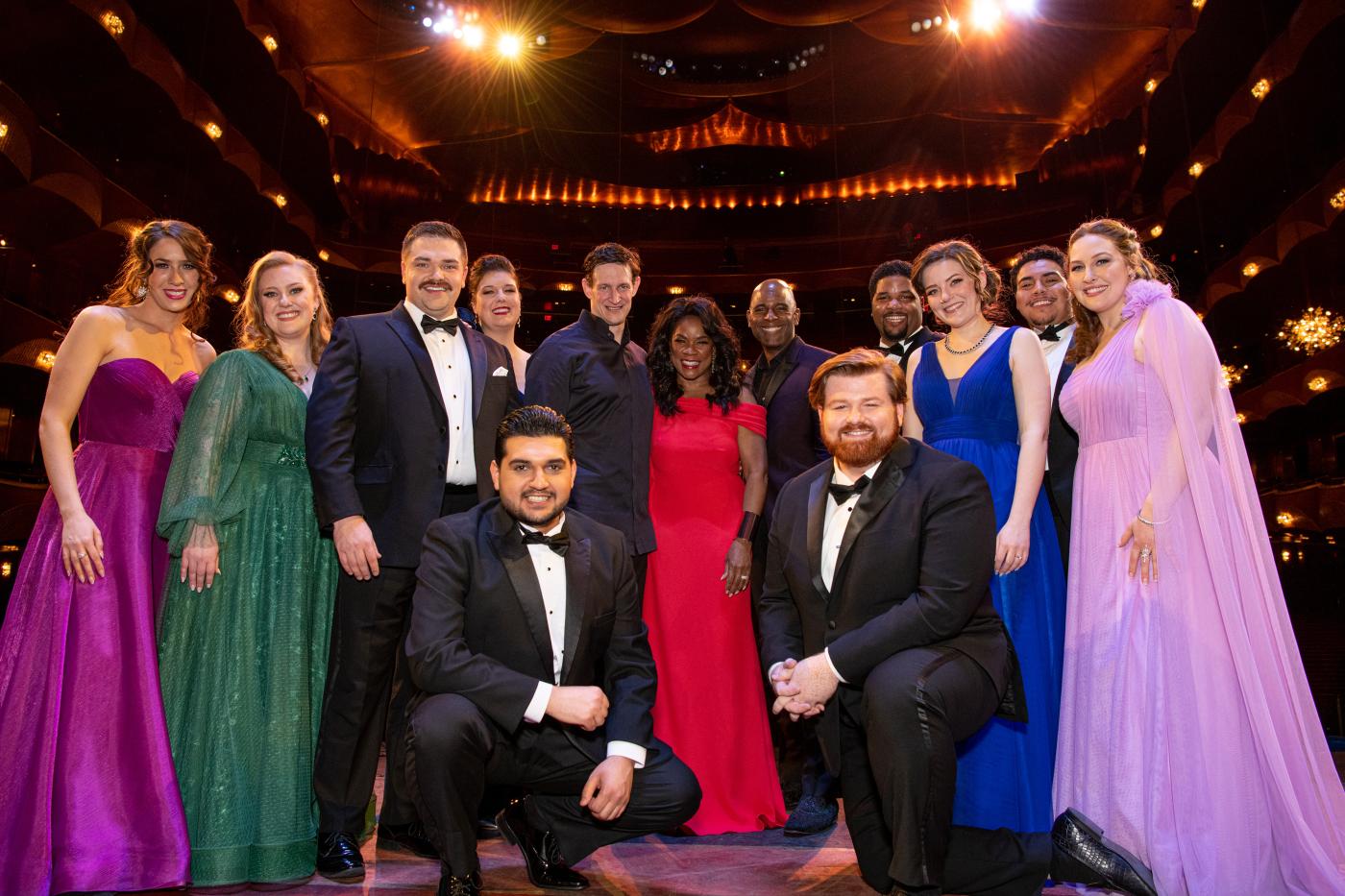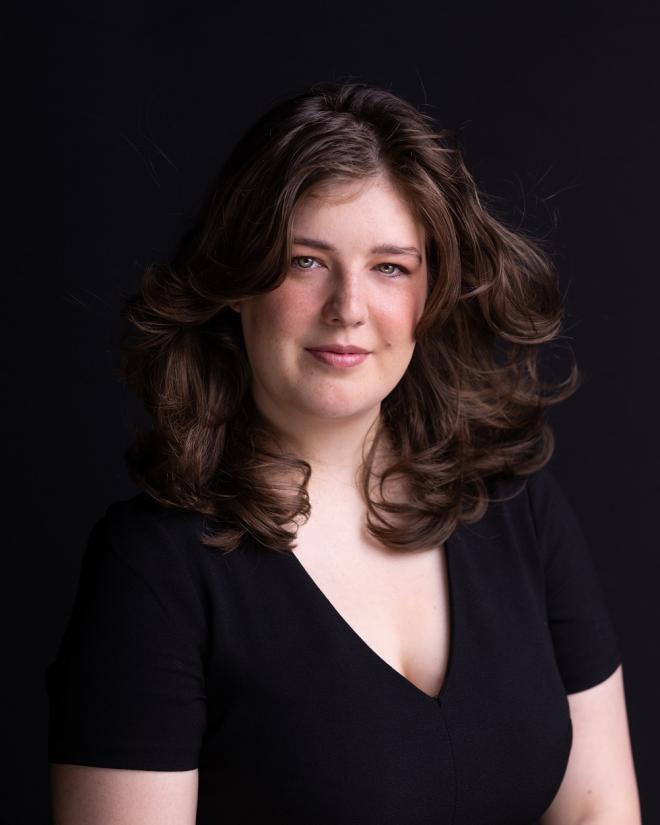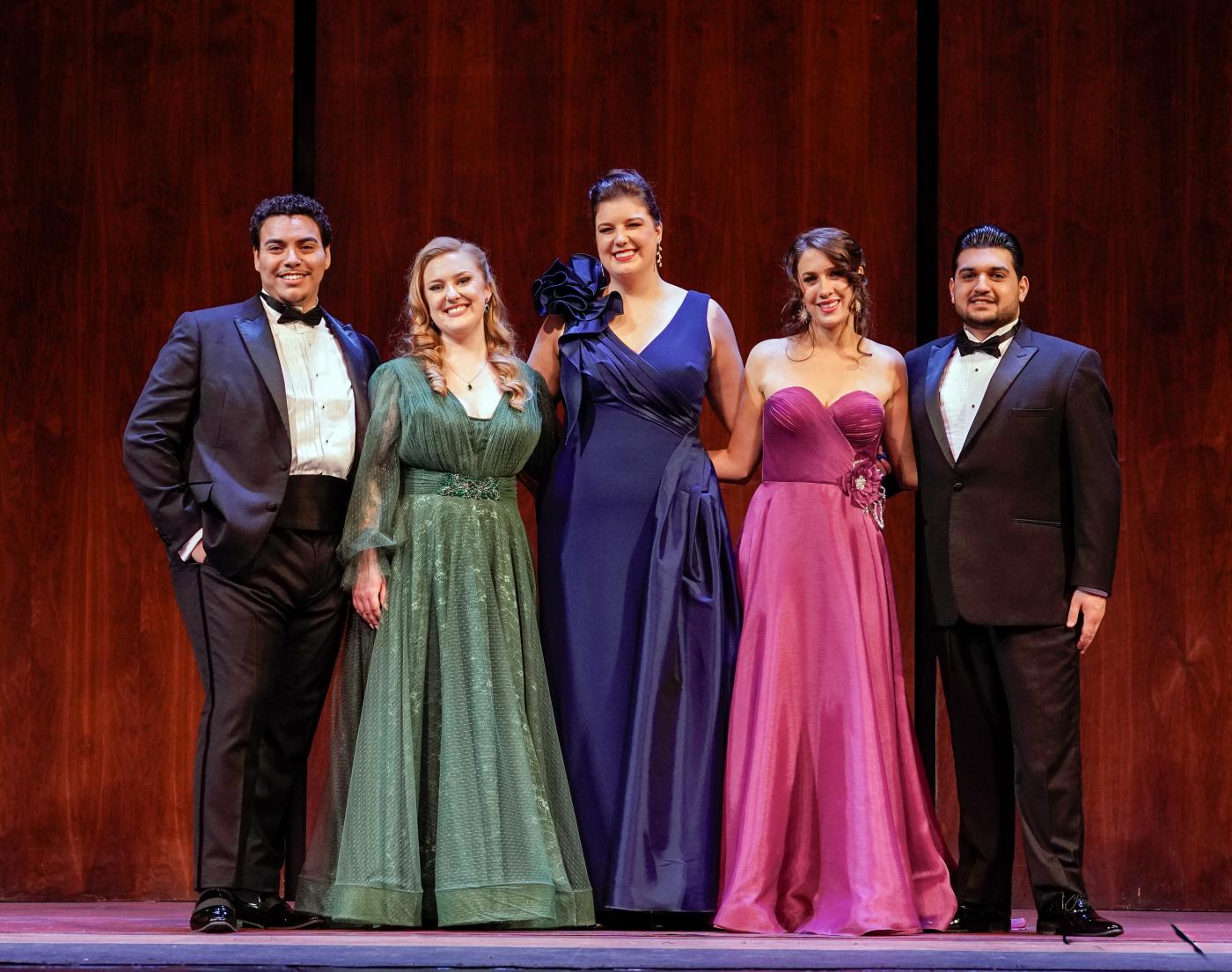The future of opera is bright when we consider the accomplished young rising stars on the scene today, some of whom were recent winners in the Metropolitan Opera Eric and Dominique Laffont Competition. Since 1954, this program has given a spotlight to promising young singers as they grow as artists, and provides important exposure throughout the opera world. It’s an important springboard, as witnessed by previous Laffont winners Lawrence Brownlee, Renée Fleming, Jamie Barton, Eric Owens, Ben Heppner and Lisette Oropesa.
Competitors in the 2024 Laffont Competition performed in a series of auditions on the local, regional and national levels. In March, the Met announced this year’s winners, who are listed below. In addition to a cash prize, each Laffont winner receives exposure, valuable networking opportunities and the prestigious title as a Laffont Competition winner.
Front L to R: Navasard Hakobyan, Nathan Bowles
Photo: Natalie Powers / Met Opera
One of the 2024 winners, soprano Emily Richter, hails in part from Arlington, Virginia, although she has earned the right to be called “a citizen of the world”, having been raised in various parts of the world, including Zimbabwe and Armenia, London and Tokyo. Ms. Richter earned music degrees at Lawrence University and McGill University in Canada. She’s currently a second-year Resident Artist at Pittsburgh Opera, where she’s performed in Mozart’s Le Nozze di Figaro and taken on the challenging role of Iphigénie in Gluck’s’s Iphigénie en Tauride. Ms. Richter was selected to participate in the Lyric Opera of Chicago’s Ryan Opera Center Ensembles, and took first prize in the Mildred Miller Competition. Included in her hectic performance schedule was the demanding role of Donna Anna in Mozart’s Don Giovanni with Montreal’s Opera McGill. As a recitalist, Ms. Richter will perform in Pittsburgh Festival Opera’s Legends in the Making Recital series. Ms. Richter’s individual Laffont award carries the title, The Birgit Nilsson Award of the American-Scandinavian Foundation.*
I recently asked her about the heady experience of winning the Laffont Competition, her ties to the Washington, D.C. area, and the art of perfecting roles.
Linda Carducci: The mere privilege and prestige of competing in the Laffont Competition – let alone being selected as a winner -- indicates years of rigorous, hard work in crafting talent to a professional level. Was there a point in your training where you knew you had the talent and musical skill to perform on world stages?
Emily Richter: It truly is such an honor just to stand on the Met stage. I think the feeling that you can really “do it” evolves slowly over time. The further I go the more I realize just how many wonderful singers there are, how high the bar is, and the element of luck in all of this. There really are no guarantees. So I’ve never felt like there was a guarantee this would happen. I think I always felt drawn to singing and felt I had something to offer as a singer from a young age starting out in choirs! But in my time in my Masters at McGill I feel like I built a lot of confidence in my skills to learn music and successfully perform at a high level. It was COVID so all the operas were performed under lots of uncertainty and really stressful circumstances. I definitely came to realize that I perform well on a tightrope and honestly enjoy high-stakes performance.
LC: Pittsburgh Opera has a long and storied tradition, thanks to its decades of first-class productions with superb singers. When I worked for The Pittsburgh Symphony’s public relations office, which shared offices and a performance venue with Pittsburgh Opera, I took every opportunity to experience the Opera’s performances. Tell us about the environment and support system you have encountered while in residence there, and some of your upcoming roles with Pittsburgh Opera.
ER: I have absolutely loved my time at Pittsburgh Opera. I think the biggest thing that makes it such a special program is that we are onstage performing the whole time. Two of their shows every year are performed by Resident artists as Principal artists. For instance this season I got to sing Iphigénie in Iphigénie en Tauride as well as Ma in Proving Up. I never felt on the sidelines -- I felt like I was in the arena figuring out who I was as an artist in real time. To get to actually perform principal roles at a major house is the kind of experience I would have had to wait a much longer time for otherwise. I’m very grateful. The coaches are also amazing. I feel like any role I learned with them is airtight and has also graduated my musicianship.
LR: You’ve maintained ties to the Washington, D.C. area. Specifically, this year’s Laffont Competition was conducted by Evan Rogister, who has earned praise as Principal Conductor of Washington National Opera. And in Pittsburgh, you work with the indefatigable Antony Walker, who serves as both Music Director of Pittsburgh Opera and Artistic Director/Conductor of Washington Concert Opera. Did your experience living in the Washington, D.C. area shape your opera aspirations?
ER: My early training as a musician began in DC from voice and piano lessons to high school theater and choir! So I feel very connected to those teachers and that training. But I think the biggest influence was living so close to the Kennedy Center, Signature Theater, Wolf Trap and so many other amazing cultural centers at my fingertips at a young age. Being exposed to great art and music is so important for any human being but, especially any young musician. It shows you what’s possible. It’s inspiring!
LR: At this stage in your career, you’ve already mastered some difficult soprano roles: Donna Anna in Don Giovanni and Iphigénie in Gluck’s’s Iphigénie en Tauride, for example. Does mastering a role endear it to you? Looking ahead to your career, what other roles do you especially hope to perform?
ER: Oh, absolutely, I love a challenge. Those two characters were especially interesting to me because their characters are somewhat removed so you have to earn access to their inner world as an actress. They don’t show all their cards with everyone you really have to fill in the blanks. So not only is it fun to unlock them musically and technically, but also emotionally and dramatically. I have many, many other role aspirations! Some of my dream roles would be Violetta in La Traviata and Elvira in I Puritani. I’m excited to see what repertoire possibilities open up in these next few years!
Learn more about Emily Richter and her calendar of performances through her website.
2024 Laffont Competition Winners
- Daniel Espinal, tenor
- Lydia Grindatto, soprano
- Navasard Hakobyan, baritone
- Meridian Prall, mezzo-soprano
- Emily Richter, soprano
*Birgit Nilsson was an internationally renowned Swedish soprano during the mid-20th century, particularly acclaimed for her powerful performances in dramatic roles of Richard Strauss and Richard Wagner operas.
PBS PASSPORT
Stream tens of thousands of hours of your PBS and local favorites with WETA+ and PBS Passport whenever and wherever you want. Catch up on a single episode or binge-watch full seasons before they air on TV.


